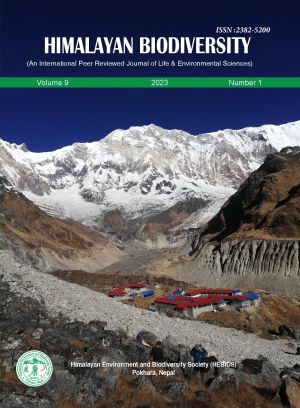Study on Plant-Based Traditional Knowledge for Pest and Disease Management of Crop Plants in Pokhara Metropolitan City Ward No.32, Kaski
DOI:
https://doi.org/10.3126/hebids.v9i1.59586Keywords:
Diseases, indigenous knowledge and practices, pests, plant usesAbstract
Indigenous traditional knowledge (ITK) is knowledge belonging to a particular community or the native group that has been developed over time and still continues to grow with time. A case study was conducted from March to Mid-May of 2023 in villages of ward no.32 of Pokhara metropolitan city, Kaski district of Nepal to explore the indigenous practices followed by traditional farmers of Pokhara-32 for the management of pests and diseases of major crops using plants and their by-products. The data was collected via in-person interviews with the local farmers. A total of 40 farmers were considered for interviews that used a pretested questionnaire. From the interviewed respondents, many common practices using the plants and their by-products in pest and disease management were noted down such as the use of plant debris and wood ashes, intercropping, green manuring, mulching, and using some local plants as pest and insect repellent. A total of 19 plant species were found to be used by local farmers for pest and disease management. During the study, it was discovered that farmers are slowly starting to shift towards the use of chemical insecticides and pesticides. In the study, it was discovered that almost all the farmers are using insecticides and vitamins to increase their yield. The study recommends the concerned stakeholders need put more focus on the preservation of the ITK, document all the indigenous knowledge, and aware people about the importance of indigenous knowledge in producing healthy and organic crops.
Downloads
Downloads
Published
How to Cite
Issue
Section
License
© Himalayan Environment and Biodiversity Society (HEBIDS)

